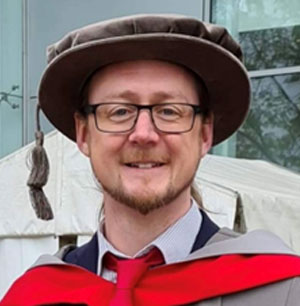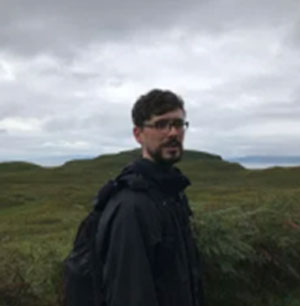Research sabbaticals case studies

Dr Rob Hawkes
- Senior lecturer, English Studies
What are some of the milestones you achieved on your sabbatical?
The main milestones I achieved on sabbatical were the securing of a contract with Palgrave Macmillan for my book Literature, Money, and Trust, 1890-1990: Monetary Modernisms, the recording and release of a three-part podcast series on 'Postmodern Money Theory' for the Money on the Left (MotL) podcast, my joining the MotL editorial collective as co-editor of the MotL journal: Money on the Left: History, Theory, Practice, and the presentation of a paper at the 'Trusting and Distrusting the Digital World in Imaginative Literature' conference at University College Dublin, leading to an invitation to contribute to an edited volume.
Is there a specific achievement you are most proud of?
My book contract is by far my proudest achievement. It matters because I can now continue working towards the completion of the project with the confidence of knowing that it is contracted for publication and that my work has been strongly endorsed by the anonymous peer reviewers.
Describe a particularly challenging moment during your sabbatical and how you overcame it.
Having been accepted to present my paper at the UCD Trust conference, which took place in June 2023, it wasn't possible to confirm the logistics of the trip until very close to the event itself. The work I presented at the conference was adjacent to but not directly drawn from the work for my monograph, which was of course the main focus of the sabbatical. The element of uncertainty over my attendance at the conference made it difficult to plan for the final months of the sabbatical. I overcame this by having a flexible plan for the latter stages of the sabbatical period, either focusing on the conference paper or on further work for the monograph.
How has the sabbatical transformed your approach to work and problem-solving?
The sabbatical afforded me the time and space to think more broadly about the contexts in which my research might be applied and to develop collaborative relationships within and beyond the University, for example with the Money on the Left collective, the UCD-based TRUST project, and with the colleagues at Teesside with whom I have been discussing a MIMA-based podcast and other impact-related projects.
Any advice to colleagues considering a sabbatical?
Go for it! The sabbatical enabled me to make very significant progress in my research, not least in relation to my monograph project but in several other areas too. I am immensely grateful to have had this opportunity and would love to see more colleagues benefiting from the sabbatical scheme in future.

Dr Danny McNally
- Senior lecturer, human geography
What are some of the milestones you achieved on your sabbatical?
I wrote two new chapters for the monograph, submitted one of the new chapters to Progress in Human Geography, was awarded funding from the British Academy, and published a Special Issue in the journal Planning Theory and Practice.
Describe a particularly challenging moment during your sabbatical and how you overcame it.
Initially I wanted to apply to the AHRC for their Early Career Fellowship in Cultural and Heritage Institutions. But when the scheme opened it was restrictive with who I could collaborative with. To overcome this, I wrote an application to the British Academy instead.
How has the sabbatical transformed your approach to work and problem-solving?
Yes. I became more effective and efficient when writing. The concentrated time the sabbatical afforded me really helped me get back into the flow of writing.
Any advice to colleagues considering a sabbatical?
Make time to meet people for coffee and research chats. Make a list of people you want to discuss your work with and get advice from and drop them an email. This helps to avoid feeling isolated, and is also great for developing your network.

Dr Paul Alexander Stewart
- Principal lecturer, research and innovation
What are some of the milestones you achieved on your sabbatical?
I achieved all my milestones outlined in my application and extended my international research network. Some of these milestones included; the translation of editorial in China- on curating and Shanghai Arts, delivering two keynotes at the Glasgow School of Art and Coventry University, delivering and organising the London conference of critical thought at London MET, completing several book chapters, founding a new research group entitled: Helsinki arts, which has 24 researchers connected across an international pool of artists and academics, submitting bids, and the establishment of a British Art Network Research Group- The ignorant Art School- funded with Goldsmiths as the lead.
How has the sabbatical transformed your approach to work and problem-solving?
It has made space for me to think outside of my existing work and extend my practice and research far more than I could have anticipated.
Any advice to colleagues considering a sabbatical?
Don't look at your emails, unless it's on the agreed times to remain connected. Make a clear structure of activity but also allow space for new thinking!
